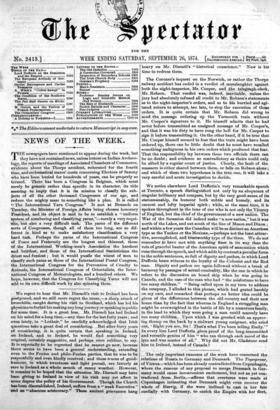We notice elsewhere Lord Dufferin's very remarkable speech at Toronto,
a speech distinguished not only by an eloquence of singular brilliancy and compass, but by the racy good-sense of its statesmanship, its humour both subtle and homely, and its earnest and lofty imperial spirit ; while, at the same time, it is spoken throughout in the tone of one who is not only the Viceroy of England, but the chief of the government of a new nation. The War of the Secession did indeed make " a new nation," but it was north of the Lakes, and not south of the line of Mason and Dixon ; and within a few years the Canadian will be as distinct an American type as the Yankee or the Mexican,—perhaps not the least attrac- tive, accomplished, and trustworthy type of the three. We do not remember to have met with anything finer in its way than the vein of graceful banter of the American spirit of annexation which runs through the speech, and which adds by contrast a peculiar force to the noble sentences, so full of dignity and pathos, in which Lord Dufferin bears witness to the loyalty of the Colonist and the Red man. Dignity and pathos are again followed without a break of harmony by passages of actual comicality, like the one in which he refers to the discussion on board ship when he was going to Canada, and the case of the man who had "the misfortune to have too many children." "Being called upon in my turn to address the company, I alluded to this phrase, which had grated harshly on my ears, and remarked that perhaps no better idea could be given of the differences between the old country and their new home than by the fact that whereas in England a struggling man might be overweighted in the battle of life by a numerous family, in the land to which they were going a man could scarcely have too many children. Upon which I was greeted with an approv • ing thump on the back by a stalwart young emigrant, who cried out, Right you are, Sir ! That's what I've been telling Emily.'" In every line Lord Dufferin gives proof of the long-transmitted and versatile genius of him "who ran through each mood of the lyre and was master of all." Why did not Mr. Gladstone send him to Ireland, instead of Canada?






























